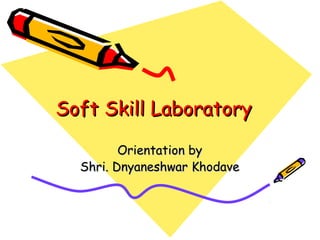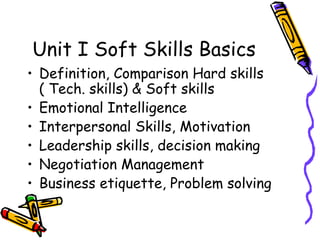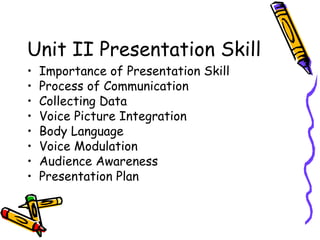Soft skill laboratory orientation
- 1. Soft Skill Laboratory Orientation by Shri. Dnyaneshwar Khodave
- 2. Examination Scheme Term Work: 25 Marks ŌĆó Objectives- ŌĆó To develop soft skills ŌĆó To enhance Students performance at interviews, GD etc ŌĆó To enable to make effective presentation ŌĆó To learn to develop self-confidence
- 3. Unit I Soft Skills Basics ŌĆó Definition, Comparison Hard skills ( Tech. skills) & Soft skills ŌĆó Emotional Intelligence ŌĆó Interpersonal Skills, Motivation ŌĆó Leadership skills, decision making ŌĆó Negotiation Management ŌĆó Business etiquette, Problem solving
- 4. Unit II Presentation Skill ŌĆó Importance of Presentation Skill ŌĆó Process of Communication ŌĆó Collecting Data ŌĆó Voice Picture Integration ŌĆó Body Language ŌĆó Voice Modulation ŌĆó Audience Awareness ŌĆó Presentation Plan
- 5. Unit III Group Discussion ŌĆó Basics, Importance of GD ŌĆó Nature of GD and debate ŌĆó Strategy of GD ŌĆó Techniques of GD ŌĆó Group Interaction Strategy ŌĆó Points for GD Topics
- 6. Unit IV Interview Preparation ŌĆó Process, Characteristic of Job Interview ŌĆó Pre- interview technique ŌĆó Preparing for the Interviews ŌĆó FQA ŌĆó Attending the Interview ŌĆó Employers expectations ŌĆó General Etiquette ŌĆó Dressing Sense, Posture & Gesture
- 7. Unit V - Seminar & Project report Writing ŌĆó Need, Process ŌĆó Writing Abstracts ŌĆó Approval ŌĆó Report writing ŌĆó Printing & delivery of seminar ŌĆó Sequence ŌĆó Writing references ŌĆó Journal paper
- 8. Unit VI ŌĆō Other Skills ŌĆó Time Management ŌĆó Meditation ŌĆó Stress and Stress Management ŌĆó Improving Personal Memory ŌĆó Study skills ŌĆō rapid reading, notes taking ŌĆó Complex problem solving ŌĆó Creativity, Model Business Letters ŌĆó Effective e-mail communication








